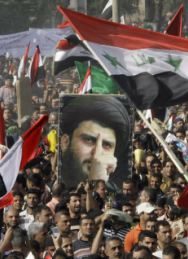
The demonstration was called by the anti-American Shiite cleric Muqtada al-Sadr, a steadfast opponent of any agreement with the United States to extend the troop presence there. The Status of Forces Agreement has been passed by the Iraqi cabinet, but to become effective it still must be approved by the nation’s parliament, which is expected to vote on the proposed pact next week.
BBC correspondent Andrew North, who was at the protest in the square where U.S. troops once tore down a statue of Saddam Hussein, reported that people waved Iraqi flags, Shiite banners, and chanted anti-American slogans. The crowd burned U.S. flags and an effigy of President Bush.
The BBC quoted from a speech delivered by one of al-Sadr’s representatives, Sheik Abdul-Hadi al-Mohammadawi:
Let the government know that America is and will not be of any use to us because it is the enemy of Islam. The government must know that it is the people who help it in the good and the bad times. If it throws the occupier out, all the Iraqi people will stand by it.
According to both Reuters news service and CNN, Sadr, who was not at the demonstration, has been in Iran since last year.
CNN reported that Firdous Square was sealed off and traffic was blocked as thousands of protesters chanted: "No no to the agreement," "No no America," and "Out, out occupation!"
Al-Sadr had called for Sunnis and Shiites to hold a unified prayer ceremony and have a peaceful demonstration against the agreement, and there was no reported violence or arrests during the two-and-one-half-hour protest. The Sadrists (as the followers of al-Sadr are called) have led opposition to the deal, but others, including Sunni Arabs and secularists, have also expressed reservations and opposition.
The Sadrists oppose having any agreement with the United States and want U.S. forces to leave immediately. They have been protesting the security agreement for months in Baghdad’s Sadr City, where the cleric has strong support. Al-Sadr controls a group of 30 members of Iraq’s 275-seat parliament.
Reuters reported that while the Sadrists have not articulated their preferred alternative to the pact, they have demanded that U.S. troops leave Iraq immediately, not in three years. They expressed doubt that the Americans would stick to the agreed timetable.
Iraqi Prime Minister Nouri Maliki has called the pact "a solid prelude to the restoration of Iraq’s full sovereignty in three years’ time." He has assured Iraqis that there are no hidden clauses in the agreement that compromise Iraqi sovereignty. Maliki has also urged swift approval of the pact by parliament, stating that if there is further delay, there won’t be enough time to develop a new agreement before the year’s end. If that happens, said Maliki, Iraq would ask the UN Security Council to renew the resolution that authorizes the presence of U.S. and allied troops in Iraq.
President Bush and Republican presidential candidate John McCain had both strongly opposed setting a deadline for troop withdraw. However President-elect Barack Obama has promised he will withdraw combat forces from Iraq within 16 months of taking office in January.
Photo: AP Images



